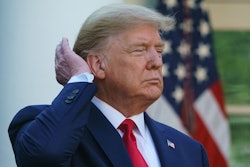 Dr. Susan Cahn
Dr. Susan Cahn
Although the bill faces an uncertain future, the objective of their legislation has already come to fruition on multiple fronts in the few weeks since it was introduced.
On Feb. 5 – on a day designated as National Girls & Women in Sports Day – President Donald J. Trump signed an executive order that calls for canceling federal funding for educational programs that permit trans athletes who were born male to participate in sports programs designed for women and girls.
The order – titled “Keeping Men Out of Women’s Sports” – prioritizes Title IX enforcement actions against such schools. It argues that schools deny female students an equal opportunity to participate in sports when they require them to compete against males or to share locker rooms where they’d be in a state of undress in front of males. The administration refers to trans women as males.
The NCAA followed suit the next day with a new policy that “limits competition in women’s sports to student-athletes assigned female at birth only.”
Republicans – buoyed by a majority of the American public who oppose trans athletes on participating teams that match their gender identity – hailed these developments as a victory for female athletes. But among scholars who study gender and sexuality in sports, there’s a widening belief that these measures could ultimately harm the women and girls they were ostensibly meant to protect.
“To me this will put lots of girls and women under suspicion,” says Dr. Susan K. Cahn, a University at Buffalo history professor and author of several books on gender and sexuality in women’s sports. “It’s a way of policing femininity really,” Cahn says.
To bolster her point, Cahn points to female athletes such as Babe Didrikson Zaharias – an Olympic medalist and championship golfer who dominated during the first half of the 20th century – who was accused of being a man.

















